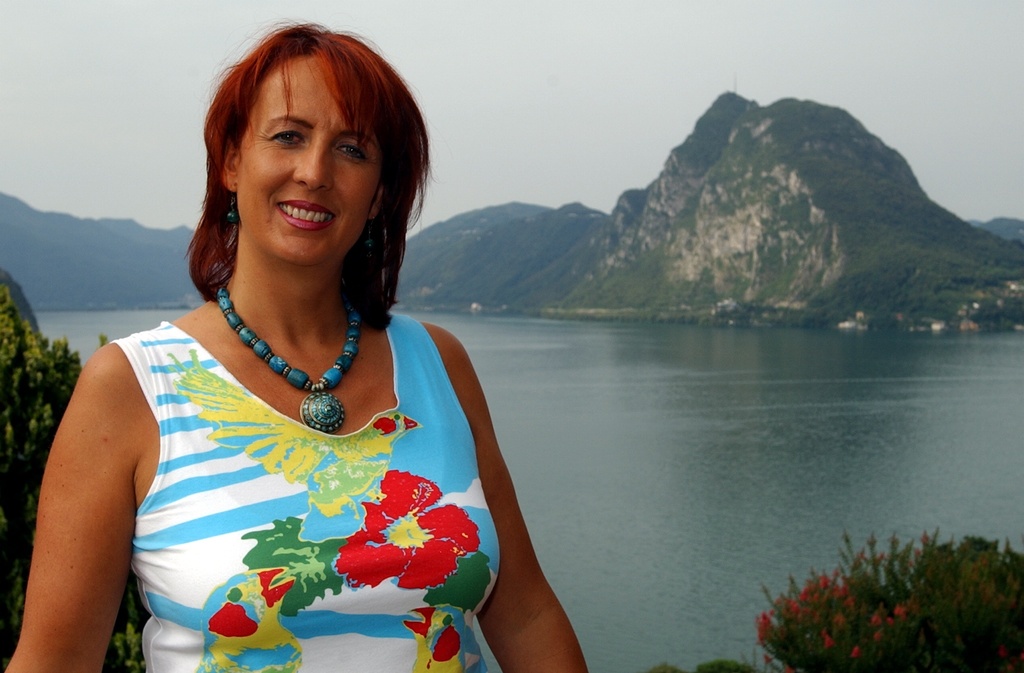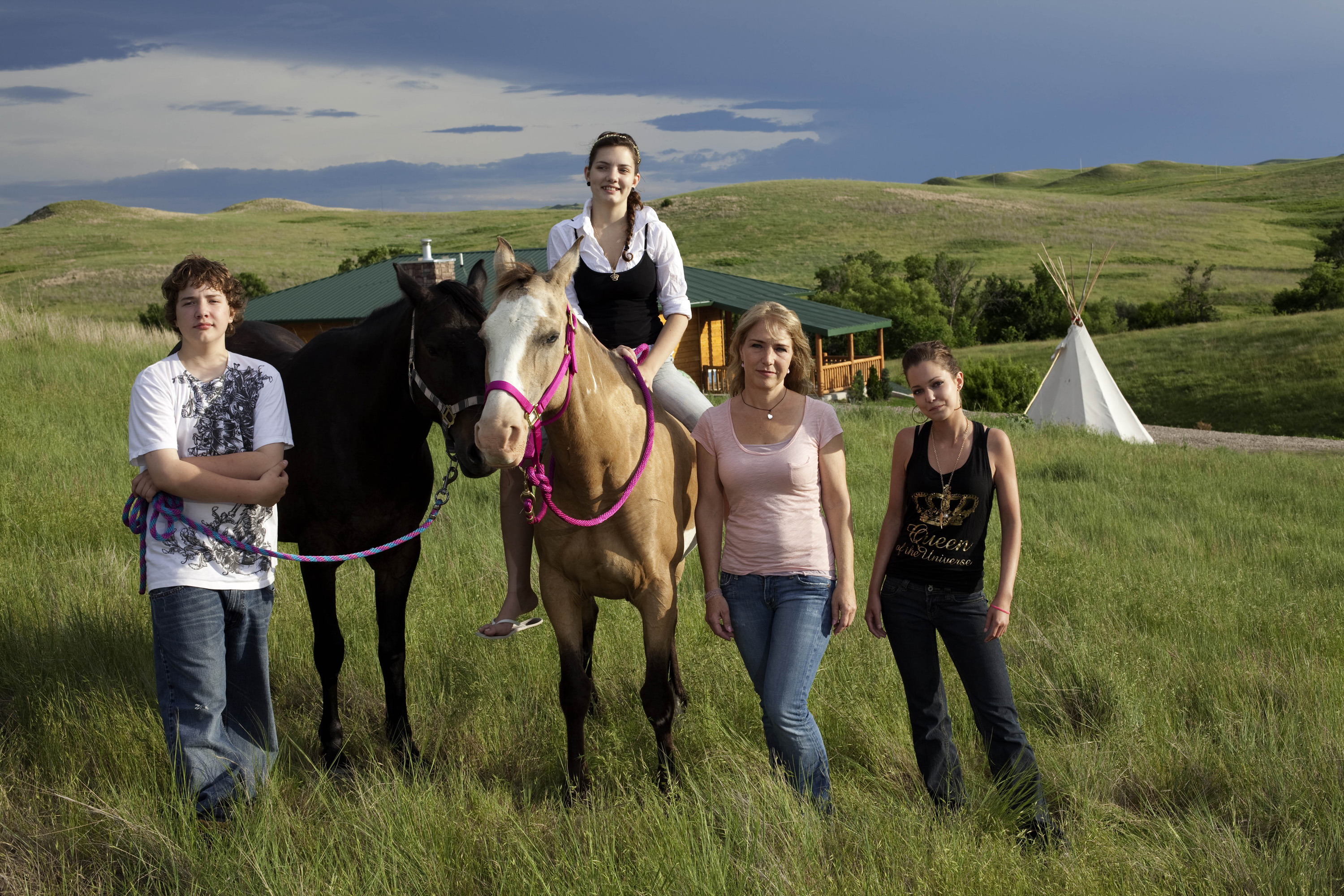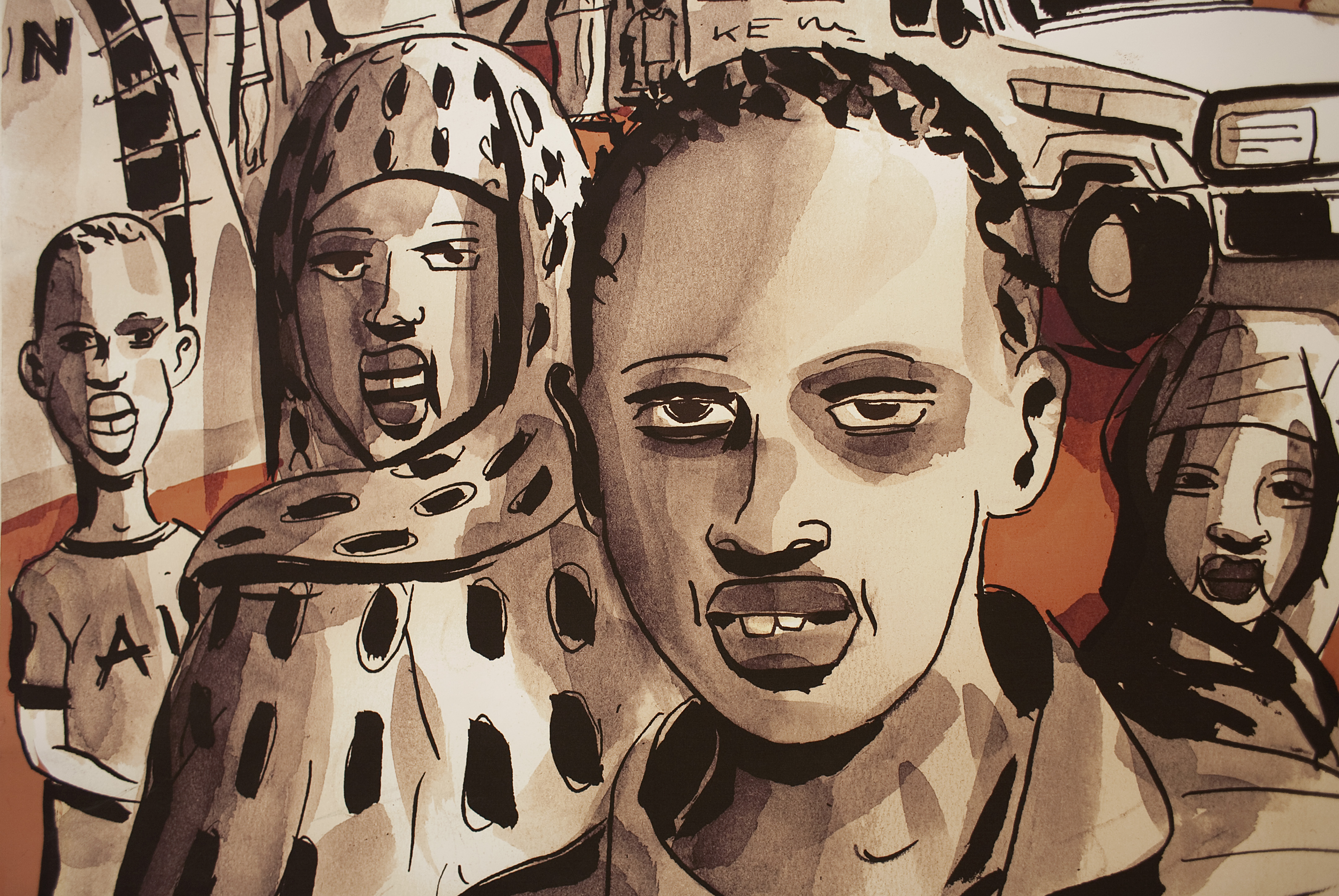‘White Masai’ rediscovers passion for Africa

Thirteen years ago after causing a sensation with her book The White Masai, Corinne Hofmann has returned to the theme of Africa with her new book, Africa, My Passion.
It tells of an arduous but glorious journey, her experiences visiting slums and her daughter’s first meeting with her Masai father.
Hofmann made a name for herself with the bestselling The White Masai, which told the story of her marriage to a Masai warrior, which eventually broke down in 1990.
Visiting Hofmann in her pretty reed house on the slopes of Monte Bré in Italian-speaking Ticino it is clear that Africa is still close to her heart. Her large sitting room with a view over Lake Lugano is full of pictures, furniture and photographs from Africa.
swissinfo.ch: After The White Masai, Back from Africa and Reunion in Barsolai, your fourth book is again focused on Africa. What is it about?
Corinne Hofmann: My latest book is divided into three parts. The first is an account of trekking I did between May and July 2009 in Namibia, the second tells of my travels around slums in Nairobi in Kenya, where I was introduced to humanitarian aid and social projects, and the third, certainly the most moving, is centred on the first meeting between my daughter Napirai – born July 1, 1989 in Wamba in north Kenya from my marriage with Lketinga, a Samburu warrior [Masai tribe] – and her father and his family.
After I had finished my author’s tour of German-speaking Switzerland, Germany and Austria in October 2008 I thought I had closed this [African] chapter of my life. But I couldn’t resist for long. By the end of 2008, after a four-week trip to India, I was longing again for Africa.
I didn’t immediately think about doing a fourth book. But in December 2008, I replied without a moment’s hesitation to an ad in a travel magazine in which a German adventure photographer was looking for an ‘author/companion with a lot of courage and a sense of humour for an expedition on foot with camels to a wild part of the world’.
swissinfo.ch: What then happened?
C.H.: The organiser contacted me straightaway, explaining that we would have to walk for six weeks in the Namibian desert. In May 2009 I left for Africa, five years after I had returned to Kenya, to Barsaloi, my ex-husband’s village, to assist the director on the White Masai film.
We covered 720 kilometres across landscapes that were sometimes luxuriant, sometimes arid, suffering from heat by day and the cold by night and at dawn.
We were accompanied by a Namibian boy aged 22 who drove the camels which were transporting the tents and luggage. I discovered truly amazing, untouched scenery, I saw wild animals, including some dangerous ones, and I met a wonderful people, the Himba nomads. Each time we made a stop, they would come out en masse and share with us their joy in life, their songs and their dances. I met splendid red women, entirely covered with a type of ochre powder mixed with oil. They spread it across their bodies and hair to protect themselves from the sun, cold and bad weather.
I was also frightened when I got lost in thick fog, which, to my surprise, came stealing across the Namibian heights. I suffered from terrible blisters on my feet and I lost 12 kilogrammes. But I enjoyed every moment of this trip because I was undergoing a unique and unforgettable experience.
swissinfo.ch: This journey led you back to Kenya.
C.H.: Indeed. My experiences in Namibia reminded me of my time in the Kenyan savannah and I felt like going back to the country in which I had left part of my heart in 1990 and in which my daughter was born. I didn’t consider going to see my ex-husband’s family on my own though because they would not have understood why I was going this time without Napirai. I had to therefore wait until my daughter was ready to discover her African roots.
I left in February 2010 for Nairobi, where, far from the modernity and residential areas of the city, I discovered the world of the slums – these huge areas of sheet metal shacks in which a million human beings try to survive. I got acquainted with several social projects such as the building of a school and a home for mothers and children. I encountered first hand true stories of around 15 women who had first lived on the streets, begging or as prostitutes.
An organisation had helped them realise their dreams and become economically independent through the microcredit system, a way of giving small amounts of funding. And I, in my own small way, created a foundation for gather funds to help these people.
swissinfo.ch: This was an experience that marked you?
C.H.: Yes, deeply. Here in Switzerland or in Europe we don’t realise that we have everything: like an excellent social and health system. It’s not the case in Africa where most people have to rely on their work and their children. But these people who have nothing, who fight to survive, have a great zest for life.
swissinfo.ch: And in the third part of the book…
C.H.: After I wrote The White Masai, readers kept asking me when I was going to write about my daughter’s first time in Kenya. It took years, the reading of letters exchanged with her father’s family and my stories for Napirai to get over her shyness and fears and to prepare her for her first trip to Africa. The decisive factor was a very touching letter from James, my ex-husband’s younger brother, who wanted to meet his niece in Barsaloi.
We left in August 2010 and the experience in the land of her birth overwhelmed Napirai. The first meeting with her father at Maralal was moving and the subsequent trip to Barsaloi allowed her to get closer to the real Africa. Her embrace with her grandmother was an indescribable moment of great emotion.
My daughter also met her four stepsisters and one stepbrother from her father’s second marriage, uncles and aunties and cousins. The ties to them and Kenya have become stronger and indissoluble. Now I can really say that Africa is my passion.
Hofmann was born on June 4, 1960 in Frauenfeld to a German father and French mother.
She studied in canton Glarus and later opened a shop selling second-hand wedding dresses in Biel in canton Bern.
Her life changed when in 1986 she took a holiday in Kenya with her fiancé. In a hotel in Mombasa she met and fell in love with a handsome Masai warrior named Lketinga, who was going traditional dances for tourists.
She broke up with her fiancé, sold the shop and left for Kenya and married Lketinga in 1988. Napirai was born in 1989 but already the marriage was suffering from Lketinga’s jealousy, which was boosted by his drinking and addiction to qat, and Hofmann’s health problems from living in harsh conditions.
In 1990 Hofmann fled to Switzerland on the premise of introducing Napirai to her family.
She later filed for divorce.
Hofmann worked in insurance and still sent money to her ex-husband and family.
In 1998 the white Masai was published to great success. It was translated into 17 languages. In 2004 it was made into a film.
Other books followed after reader pressure: Back from Africa in 2002 about her life in Switzerland and Reunion in Barsolai, 2005, about Hofmann’s return to Kenya 14 years after leaving. Africa, my passion , was published in German on May 25.
It was the topselling book in German-speaking Switzerland by June 22.
The following books are available in English (translated from German):
The White Masai
Back from Africa
Reunion in Barsolai (all Arcadia Books Ltd)
Africa, my passion is under preparation in English, according to Hofmann’s website.
(Adapted from Italian by Isobel Leybold-Johnson)

In compliance with the JTI standards
More: SWI swissinfo.ch certified by the Journalism Trust Initiative




You can find an overview of ongoing debates with our journalists here. Please join us!
If you want to start a conversation about a topic raised in this article or want to report factual errors, email us at english@swissinfo.ch.